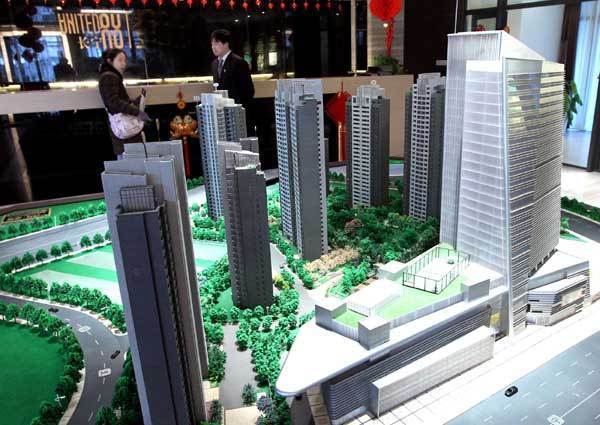Society
Shanghai property tax hard to gauge
By Wang Ying (China Daily)
Updated: 2011-01-31 08:11
 |
Large Medium Small |
 |
|
A salesman at a Shanghai residential property receives a visitor on Saturday. [Photo/Xinhua] |
SHANGHAI - The trade volume of this city's housing market slumped 40 percent on the first day of a new local property tax, and transaction volumes fell further over the weekend, according to figures from the Shanghai Real Estate Trade Center.
A total of 571 first-hand residential apartments, containing 59,388 square meters of space, were sold on Friday, the first day the new tax took effect. That was fewer than the 933 units, containing 98,682 sq m of space, that found buyers the day before, according to the center's website. Meanwhile, 420 units of commercial properties were being traded on Friday, or an aggregate gross floor area of 42,300 sq m. Both numbers had dropped more than 25 percent from the previous day.
"Apparently, the property tax has started to have an effect on the housing market," said Lu Qilin, deputy director of the Shanghai-based Uwin Real Estate Research Center.
| ||||
Even so, Zhu Pingping, an analyst from Shanghai Sinyi Realty Agency and Consulting Co, said the market's response toward the tax has been mild so far.
Zhu said it is difficult to say the shrinking transaction volume is a direct result of the new property tax. He noted that the days before the Chinese New Year's holiday are a time in which housing sales usually are slow.
"In the run-up to the Spring Festival, both buyers and sellers are distracted from the housing by family reunions," Zhu said. "The week after the festival will reveal more of the property tax's real effect."
Huang Hetao, an analyst from the local Century 21 China Real Estate, said there was good reason for enacting the new tax just before the holiday.
"The pre-Spring Festival period is a traditional off-season for property trading, and this will leave the market enough time to digest and cushion the negative impact," he said.
The slump in trade volumes itself has likely caused housing prices in this eastern city to drop as much as 10 percent. The new tax, for its part, is expected to have far greater effects after the Spring Festival. The weeks following the holiday are a time in which property sales usually occur at their highest frequency for the year, but that may not be the case in 2011.
"It is highly likely that we might see the whole first half of the year be very quiet in Shanghai, because of the tax," said Lu.
The Shanghai government on Thursday announced its adoption of the new property tax.
"Considering the property market's key role in the city's economy, housing prices won't slump very much," Lu added.
| 分享按钮 |



